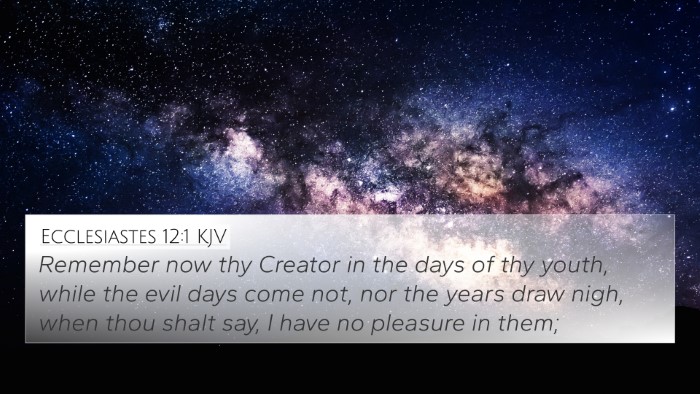Lamentations 3:27 - Summarized Meaning and Commentary
Lamentations 3:27 states: "It is good for a man that he bear the yoke in his youth." This verse offers profound insights into the themes of suffering, growth, and the formation of character. Let's explore its meaning by considering interpretations from several public domain commentaries.
Overall Interpretation
The essential meaning of this verse emphasizes the value of enduring hardships early in life, suggesting that such experiences lay a foundation for strength and resilience. The "yoke" metaphorically represents burdens or challenges that one must bear, which ultimately lead to personal development and moral fortitude.
Commentary Insights
-
Matthew Henry:
Henry highlights the idea that the "yoke" symbolizes the trials and disciplines that shape an individual. In youth, people are more pliable and receptive to learning life's lessons, making it a pivotal time for spiritual and personal growth. He suggests that undergoing difficulties while young prepares one for future responsibilities.
-
Albert Barnes:
Barnes elaborates on the notion that bearing affliction in youth is beneficial. He emphasizes that enduring such challenges fosters future strength and wisdom. According to Barnes, the spirit of man is fortified through the experiences of adversity, which can lead to a more fruitful life.
-
Adam Clarke:
Clarke expresses the importance of early trials in developing patience and perseverance. He draws connections to scriptural teachings that support the notion of suffering leading to spiritual maturity. Clarke urges readers to view hardships as formative experiences that contribute positively to their character and faith.
Bible Cross References
This verse can be cross-referenced with several others that explore similar themes of suffering, growth, and endurance. Here are some significant Bible verses related to Lamentations 3:27:
- Hebrews 12:11: "For the moment all discipline seems painful rather than pleasant, but later it yields the peaceful fruit of righteousness to those who have been trained by it."
- James 1:2-3: "Count it all joy, my brothers, when you meet trials of various kinds, for you know that the testing of your faith produces steadfastness."
- Romans 5:3-4: "Not only that, but we rejoice in our sufferings, knowing that suffering produces endurance, and endurance produces character, and character produces hope."
- Proverbs 3:11-12: "My son, do not despise the Lord’s discipline or be weary of his reproof, for the Lord reproves him whom he loves, as a father the son in whom he delights."
- Philippians 4:12-13: "I know how to be brought low, and I know how to abound. In any and every circumstance, I have learned the secret of facing plenty and hunger, abundance and need. I can do all things through him who strengthens me."
- 2 Corinthians 12:9-10: "But he said to me, 'My grace is sufficient for you, for my power is made perfect in weakness.' Therefore I will boast all the more gladly of my weaknesses, so that the power of Christ may rest upon me."
- Job 5:17-18: "Behold, blessed is the one whom God reproves; therefore despise not the discipline of the Almighty. For he wounds, but he binds up; he shatters, but his hands heal."
Conclusion
In conclusion, Lamentations 3:27 teaches vital lessons about the necessity of facing challenges in youth. As highlighted by public domain commentaries and supported by other Bible verses, these experiences are crucial for developing strength and character. By embracing hardships, individuals are prepared for future trials and can nurture their faith and maturity throughout life.
Related Topics
When studying Lamentations 3:27, one can explore various related themes, such as:
- Understanding the role of suffering in spiritual growth.
- Exploring the relationship between youth and resilience.
- Examining how scripture promotes the idea of enduring trials.
- Comparative studies of Old Testament wisdom literature with New Testament teachings.








